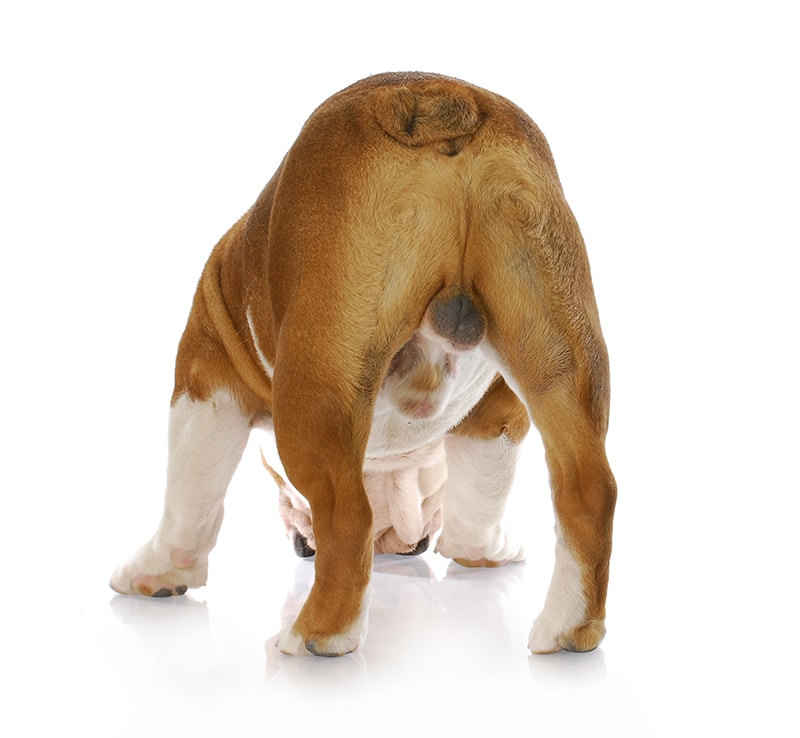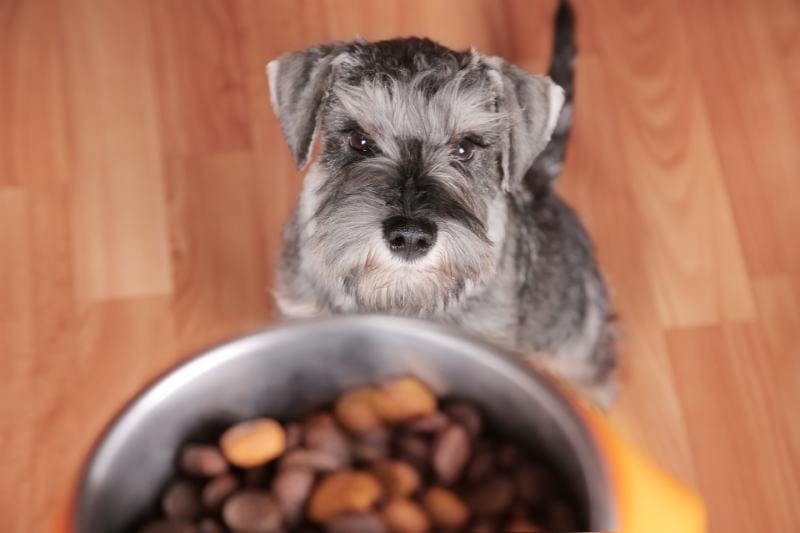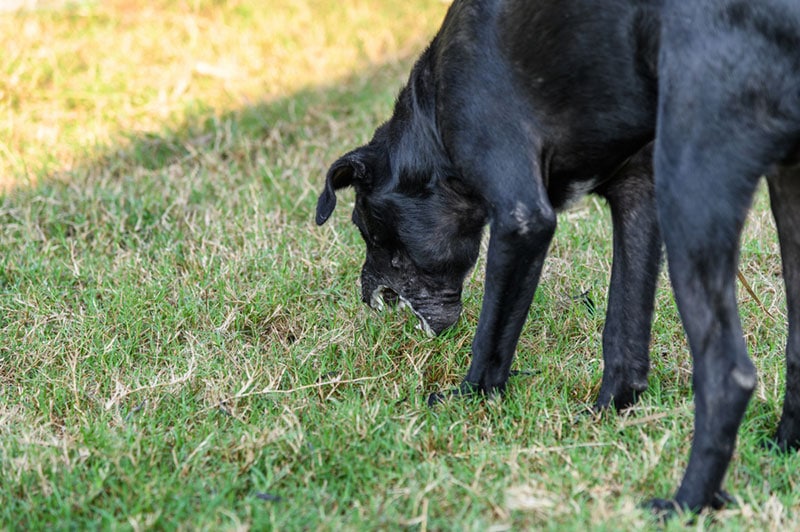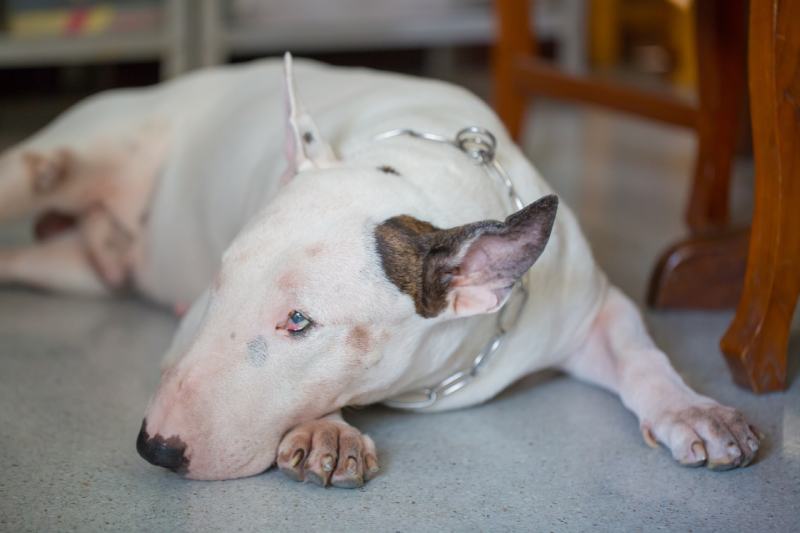Why Do Dogs Fart? Normal Digestion vs Possible Issues (Vet-Approved)
By Ashley Bates
Updated on

Click to Skip Ahead
Some dogs can quite frankly stink you out of the house and home. Their stench might leave you wondering what’s normal and what’s not when it comes to dog flatulence. After all, is it normal for any one creature to smell so bad?
If you’re wondering if dogs are supposed to fart, the answer is absolutely. However, the frequency, smell, and other bathroom habits can tell you a lot about your dog’s overall state of health. So, it is important to note any changes and report them to your veterinarian.
Let’s learn more about why dogs fart, as well as what’s normal and what isn’t, in this article.
Dogs Absolutely Fart
Dogs absolutely fart. In fact, some could say they’re master farters, always seeming to stink up a room. However, it might seem like your dog never stops making a stink around the house.
If that’s the case, you might wonder if the frequency is normal. As much as it is a taboo subject, farting can tell you a lot about your pup’s overall health. So, if you notice any change or your pup keeps stinking you out of house and home—maybe it’s time to get to the bottom of this new odor.

Reasons for Gas in Dogs
It’s normal for your dog to flatulate, but too much for too long is cause for concern. If they’re cutting the cheese a little too often, though, you may have a bigger problem. So, see if any of the following situations describe your dog’s farting habits.
1. Food Intolerance
Your dog’s diet can absolutely impact how much they flatulate. If it is diet-related, they are likely suffering from food intolerance. In other words, they are getting a nutrient through their diet that either they are allergic to, doesn’t agree with their stomach, or causes a bigger issue. Sometimes, it can be hard to pinpoint the cause of gastrointestinal upset.
You might find yourself going through food trials with your vet, changing to different recipes with no positive result. A food trial is going to take quite some time and involve a strict regulation of all foods your dog eats. But eventually, you should be able to find a diet that eases the gastrointestinal distress and your dog. Alternatively, sometimes starting with pre or probiotics can make a huge difference.
Foods that are high in fiber can also impact how much your dog farts. Some dog foods that use very cheap ingredients like byproducts, artificial dyes, preservatives, and so on can be problematic on their own.

2. Food Changes
Changing your dog’s food too suddenly can cause a wide variety of gastrointestinal problems even if they don’t have any dietary sensitivities or allergies. There are always recommendations from most reputable dog food manufacturers on their websites explaining how to transition your pup.
They will give detailed feeding instructions to avoid some of that gastrointestinal upset, but it is not a fix-all. Some dogs will be more sensitive than others, so no matter how slowly you transition them, they might take a second to adjust.
3. Table Scraps
Feeding your dog frequent table scraps or having them dig through your trash can certainly contribute to gas. They will get into all sorts of things that can cause gastrointestinal upset, anywhere from just having a couple of breaks of wind to full-blown vomiting or diarrhea.
Table scraps are terrible for dogs for a variety of reasons. First, if they are trash-digging, exactly what is being put into their systems isn’t regulated.
Suppose you think about how many things are in your trash can every day. In that case, you get a mixture of chemicals, other household products, and even toxic food items that our dogs should never have, such as onion peelings or avocado seeds.
When you have a canine in the home, it’s very important to make it a common practice never to share your food with your pet unless it is 100% pet-safe and keep a lid on your trash can to prevent them from digging around.

4. Underlying Health Conditions
Your dog might be suffering from an underlying health condition. On top of eating something they shouldn’t and having a poor diet, they might have something a little more sinister going on.
Underlying health conditions that cause farting can lead to several symptomatic displays.
Illnesses can be mild to severe in nature and require different kinds of treatments. If you think your dog might have an underlying health condition, seeking medical attention is imperative.
What Digestion Issues Can Dogs Have?
Dogs can have several gastrointestinal issues just like humans. Some of them might be genetic, others can be related to some of the things that we’ve discussed in this article. And still other things can develop over time.
Below, we will discuss some common health issues that can contribute to overall farting and give you some good pointers on when a good time is to see your vet.
1. Allergies
Allergies are a widespread problem in dogs. They can be susceptible to both environmental and food-related allergies, and they can be very difficult to diagnose. For example, your vet might suspect allergies but not know the trigger.
The signs of allergies can be vast, and some pups may suffer immensely while others have only a few signs.
Some of these include:
- Hotspots
- Skin irritation
- Diarrhea
- Constipation
- Recurring yeast infections
- Recurring ear infections
- Sneezing
- Vomiting
Allergies can take awhile to officially pin down, so be prepared for food trials or other testing.

2. Inflammatory Bowel Disease
Inflammatory bowel disease is roughly the same as human Irritable Bowel Syndrome. It is a chronic gastrointestinal disease characterized by inflammatory cells within the GI tract. Luckily, this disease does not necessarily shrink life expectancy.
Signs of inflammatory bowel disease in dogs, aside from flatulence, include:
- Rumbly tummy
- Vomiting
- Diarrhea
- Lack of appetite
- Weight loss
This disease can be difficult to treat and hard to manage. The treatment involved depends on the individual dog. Your vet might put your dog on a very strict specialized diet to curb symptoms. In some cases, there are necessary medications.
But this disease cannot be cured, unfortunately.
3. Leaky Gut
If your dog has a leaky gut, essentially, he or she has a compromised intestinal barrier. This can create a whirlwind of symptoms and discomfort for your pet. Leaky gut is something that is very difficult to diagnose and your pet can suffer for quite a long time before they find relief.
Leaky gut is caused by continual insults to the intestines. Sometimes it is from acute or long-term damage. Some causes include infections, trauma to the abdomen, certain medications, and chemicals or toxins.
Signs of leaky gut syndrome include:
- Weight loss
- Vomiting
- Soft stools
Determining a proper treatment plan can be difficult, but with patience, it will be done. Your doctor might prescribe medications that treat intestinal damage. They could also give your pup natural supplements to aid in the growth of good gut flora.

4. Lymphangiectasia
Intestinal lymphangiectasia, also called protein-losing enteropathy, is a condition in which the intestine leaks protein nutrients instead of absorbing them. It can be caused by another underlying condition, including but not limited to irritable bowel disease.
This condition can be serious, because it will force your dog’s body into breaking down the muscle proteins and reassembling them in order to make new proteins for the body.
Signs of this condition include:
- Diarrhea
- Vomiting
- Weight loss
- Fluid accumulation in the abdomen
Lymphangiectasia can be managed by treating the underlying cause, along with a diet that is high in protein but contains no more than 15% fat.
5. Exocrine Pancreatic Insufficiency (EPI)
Exocrine pancreatic insufficiency is when the pancreas doesn’t secrete the necessary enzymes needed to digest fats and proteins. As a result, your dog’s body can’t absorb nutrients properly, which can lead to weight loss even if their appetite is good.
Signs of exocrine pancreatic insufficiency include:
- Weight loss
- Large volumes of fatty stools
- Chronic diarrhea
- Excessive appetite
Management of this condition usually involves a diet that is low in fat along with medications to replace pancreatic enzymes.

6. Cancer
While uncommon, it is possible that your dog could have a development of cancer. Remember that any bowel changes are worth bringing up to your veterinarian, but some can go overlooked for a very long time. It is easy to mistake signs of cancer with other ailments.
Your vet will likely rule out all other causes before testing for cancer. Since no cancer presents the same, they will have to run tests to determine whether or not your pet has cancer.
When Should You See a Vet?
If your dog has occasional gas, this is probably nothing to be concerned about. That could happen from something as simple as eating something they shouldn’t, or simply swallowing too much air that day.
However, if your dog has frequent gas or it never seems to go away, this is likely a sign that something isn’t right. Take note of any other changes in behavior or bodily function so you can report anything to your doctor, and they can better diagnose the problem.
Your vet will give your dog a gastrointestinal workup. They may take imaging or blood work depending on what they think is best for your animal.
Conclusion
Nobody wants to be cuddling with such a cute little furry creature and have a fart bomb wafted into your face. If farting is starting to come in between you and your canine buddy, it’s time to seek veterinary guidance.
A couple of toots here and there are okay, but cutting the cheese every time the wind blows? Something just isn’t right. Since so many conditions share the same symptoms, it’s best to get to the bottom of it as quickly as you can. Make an appointment with your vet today if your dog is farting more than usual.
Featured Image Credit: Natalia Fedosova, Shutterstock
















